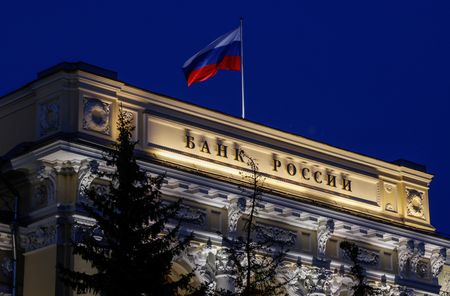By Elena Fabrichnaya
MOSCOW (Reuters) – Russia’s central bank recommended on Tuesday that retail investors convert their foreign currency Eurobonds into local “replacement bonds” as 5.7 trillion roubles ($81 billion) of investor holdings remain frozen by Western sanctions.
Since Russia launched what it calls its “special military operation” in Ukraine last February, foreign payment companies have blocked rouble transactions due to sanctions, making it harder for Russian companies to pay holders of their Eurobonds.
In response, President Vladimir Putin signed a decree last July allowing Russian companies to issue “replacement bonds”, which are denominated in foreign currencies such as Eurobonds but are repaid in roubles.
Several major Russian companies, including state-run gas giant Gazprom and oil firm Lukoil, have substituted their Eurobonds in this way.
“In practice, we see an increase in the number of companies that have decided to issue replacement bonds,” said Olga Shishlyannikova, who heads the central bank’s financial intermediaries department.
At the moment, investors who hold Eurobonds issued by Russian companies are blocked from receiving payments. By switching to replacement bonds, retail investors will be able to unlock these assets, Shishlyannikova said.
“If all Russian-origin Eurobonds are substituted, then for retail investors this will allow more than 50% of their assets, which are now blocked, to be unblocked and allow them to start managing them,” she said.
Shishlyannikova added that 20% of the 5.7 trillion roubles of investor holdings blocked in foreign infrastructure belonged to retail investors.
The conflict in Ukraine and ensuing barrage of Western sanctions have upended some sectors of Russia’s economy, cutting its biggest banks from the SWIFT financial network, curbing its access to oil markets and freezing half of its $640 billion worth of gold and foreign exchange reserves.
While the government and central bank have acknowledged “difficulties”, Moscow says its economy is resilient and that sanctions have boomeranged against the West by driving up inflation and energy prices.
(Reporting by Elena Fabrichnaya; Writing by Caleb Davis; Editing by Gareth Jones)

